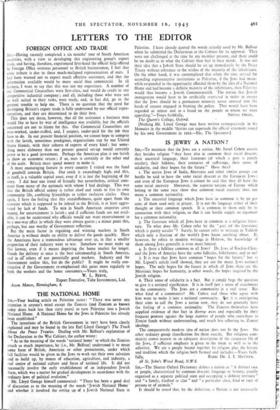LETTERS TO THE EDITOR
FOREIGN OFFICE AND TRADE
Sat,—Having recently completed a six months' tour of South American countries, with a view to developing this engineering group's export trade, and having, therefore, experienced first-hand the official help offered by Foreign Office overseas personnel to British businessmen, I feel that some tribute is due to these much-maligned representatives of ours. I had been warned not to expect much effective assistance, and that the information available would be more social than commercial. In all fairness, I want to say that this was not my experience. A number of our Commercial Counsellors were first-class, and would do credit to any competitive industrial company ; and all, including those who were not so well suited to their tasks, were ready, and, in fact did, go to the greatest trouble to help me. There is no question that the need for developing Britain's export trade is fully understood by our official repre- sentatives, and they are determined to do their best.
This does not mean, however, that all the assistance a business man would like to have by way of intelligence was available, but the officials concerned are not to blame for this. Our Commercial Counsellors are over-worked, under-staffed, and, I suspect, under-paid for the job they have to do. In our present financial position, we cannot hope to compete with the lavish, sometimes prodigious, organisations run by our United States friends, with their cohorts of experts of every kind ; but some- thing more elaborate than our present general set-up would certainly prove to be a good investment. Perhaps the American plan is too lavish to show an economic return ; if so, ours is certainly at the other end of the scale. Britain must spend money to make it.
A most encouraging feature in every country I visited was the fund of goodwill towards Britain. Our stock is exceedingly high, and this, in itself, is a valuable capital asset, even if it is just the beginning of the story. I did hear one trend of friendly but nevertheless, critical com- ment from many of the nationals with whom I had dealings. This was that the British official colony is rather aloof and tends to live its own community life, confining ffiendships to rather exclusive circles. Once again, I have the feeling that this standoffishness, quite apart from the restraint which is supposed to be inbred in the British, is at least aggra- vated by lack of funds. To mix in South American countries costs money, for entertainment is lavish ; and if sufficient funds are not avail- able, it can be understood why officials would not want entertainment to be a one-way affair in which they were always guests ; a minor point this, perhaps, but one worthy of Government reflection.
But the main factor in regaining and winning markets in South America is without doubt an ability to deliver the goods quickly. Here the Americans have a tremendous advantage over us, in that a smaller proportion of their industry went to war. Somehow we must make up this leeway, even if it means depriving the home market for longer. Goods for delivery at once is the best salesmanship in South America, and in alr others of our potentially good markets. Industry and the Government realise this, but do the public? It might be really con- structive if the Government re-emphasised this point more regularly to both the workers and the home consumers.—Yours truly, W. L. REEVE,
Export Executive, Tube Investments, Ltd. Aston Manor, Birmingham, 6.






























 Previous page
Previous page